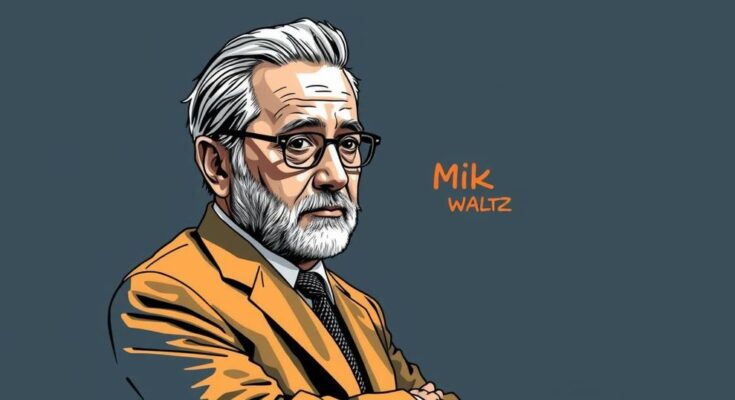Donald Trump’s choice of Mike Waltz as national security advisor signifies a strategic pivot towards the Indo-Pacific, emphasizing a tougher stance against China while potentially strengthening U.S.-India relations. Waltz’s military expertise and advocacy for enhanced defense cooperation might facilitate India’s countermeasure strategies against Chinese aggression. This appointment also prompts NATO allies to reevaluate their positions as U.S. focus shifts.
Mike Waltz, recently appointed as Donald Trump’s national security advisor, is emerging as a pivotal figure for U.S. foreign policy, especially concerning China and India. His previous advocacy for a boycott of the 2022 Winter Olympics and calls for a military build-up signify a decisive shift in focus from Europe and the Middle East towards the Indo-Pacific region. Waltz’s strong stance against the Chinese Communist Party suggests a potential escalation in U.S.-China relations and presents a strategic advantage for India amidst its own tensions with China. Waltz brings extensive experience to his new role, having served in the Army and held strategic positions in the Pentagon. His commitment to strengthening U.S.-India relations is evident in his role as co-head of the India Caucus in Congress, ultimately signaling increased collaboration in defense and strategic priorities. Facing rising tensions along the Line of Actual Control with China, India may find essential support through revived U.S. military engagements under Waltz’s guidance. While the Trump administration’s emphasis on a harder line against China is welcomed in India, it poses potential challenges for NATO allies. Waltz’s perspective on enhancing U.S. military capabilities raises questions regarding the long-term implications of U.S. foreign policy, which may prioritize conflicts specifically in Asia. As China continues to assert its influence through initiatives like the Belt and Road Initiative and assertive movements in the South China Sea, the alignment of U.S. and Indian interests under Waltz could evolve into a robust counterbalance to Chinese expansion.
The appointment of Mike Waltz as national security advisor marks a crucial transition in U.S. foreign policy, particularly regarding the Indo-Pacific strategy. Waltz has established a reputation for his critical stance toward the Chinese Communist Party and is seen as a catalyst for enhancing U.S.-India relations. His focus on military preparedness, defense spending, and calls for a unified approach to counter Chinese aggression aligns well with India’s strategic interests, which are challenged by China’s growing assertiveness in the region. This backdrop illustrates the geopolitical climate wherein Waltz’s policies may unfold, reflecting a commitment to bolster U.S. presence in Asia as a countermeasure to China. Waltz’s emphasis on military capabilities also underscores his role as a supporter of strengthening domestic defense infrastructures and bilateral ties with allies that share similar threats from China. As the U.S. navigates its responses to rising global tensions, Waltz’s ideologies serve as both an opportunity for India and a key factor that could reshape international alliances, particularly concerning NATO and other global partnerships. With the ongoing trade disputes and ideological confrontations with China, the significance of Waltz’s role stands out, particularly as the U.S. seeks to recalibrate its foreign policy priorities. The insights provided by Waltz may pave the way for deeper strategic dialogues and increased military cooperation with India, thereby altering the power dynamics in the Indo-Pacific.
In summary, Mike Waltz’s appointment as national security advisor under President Trump potentially ushers in a period of intensified U.S. engagement in the Indo-Pacific region, with significant implications for both India and China. His unwavering commitment to countering Chinese aggression reflects a decisive approach that India can leverage to strengthen defense ties. Conversely, this shift may present challenges for U.S. relationships with NATO allies, heightening discussions about global security strategies. Waltz’s focus on military enhancement and strategic alliances signifies a transformative chapter in U.S. foreign policy, highlighting the complexities of a rapidly evolving international landscape.
Original Source: m.economictimes.com




